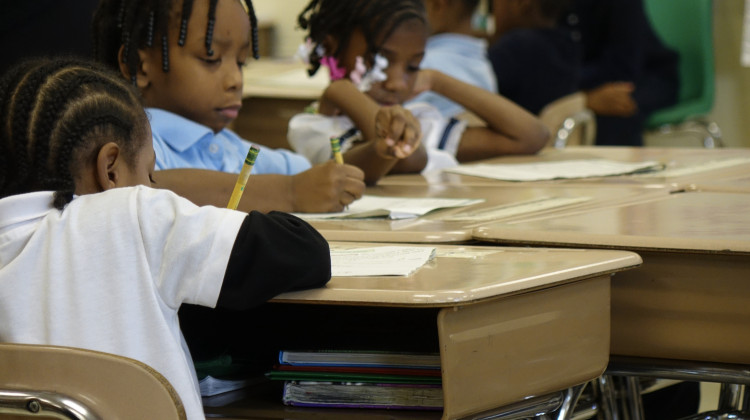
First grade students work on an assignment in a classroom at Gary Community School Corp.
Eric Weddle / WFYIDozens of new Indiana laws go into effect July 1. Among those with direct impact on students and teachers are changes to what must be taught and cannot be taught in classrooms, who qualifies for state funds to pay for private school tuition, and graduation requirements.
The Indiana Department of Education and other state agencies are continuing to publish guidance on how the new laws should be carried out. Here is a look at seven of them:
Free textbooks
Families will no longer have to pay for textbooks, workbooks, software, and devices, like laptops and Chromebooks if they are used instead of textbooks for a single student. A new $160 million state reimbursement fund will cover the costs for K-12 students at traditional school districts and charter schools. Non-public schools are still allowed to charge for books and other curricular materials. Schools must pay anyremaining costs, if the state fund does not cover it all. Parents with outstanding bills for past textbook fees can still face collection from schools.
Voucher expansion
Nearly all families in the state now qualify for a voucher to help cover the cost of tuition at a private or religious school. The biennial state budget removed eligibility requirements and boosted the income limit for a family of four to $220,000, or 400 percent of the amount required for the federal free and reduced-price lunch program. The state estimates more than 40,000 new students will qualify for the Choice Scholarship Program over the next two years. This past school year in Indiana, 53,262 students took part in the program and the average grant amount toward tuition was $5,854. Indiana’s expansion comes as other Republican-led states, like Florida and Arizona, offer vouchers to all students.
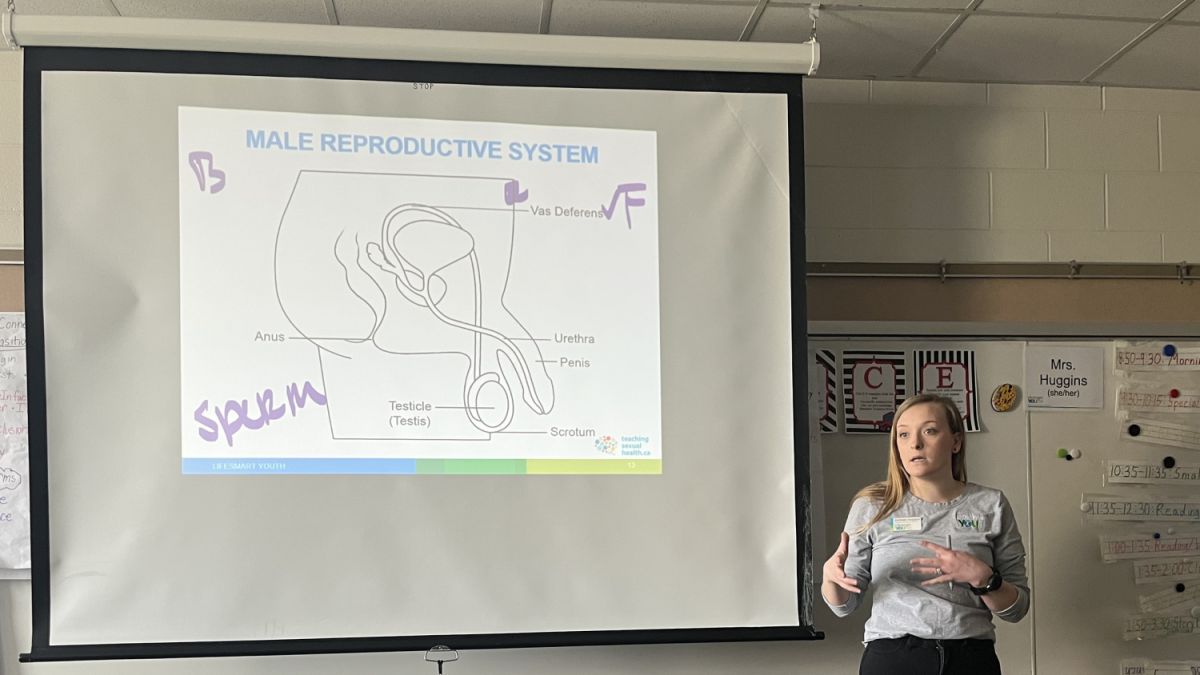
Student pronouns and sex education
Indiana joined other states in passing laws that target LGBTQ+ youth. School officials are now required to provide written notification to a student’s parent or guardian if the student requests to be called by a different name, “pronoun, title, or word,” according to HEA 1608. That must be done within five business days of the student’s request.
The law also blocks teaching on “human sexuality” in prekindergarten through third grade classes. But which topics, issues or words related to human sexuality are actually prohibited are not defined.
The ACLU of Indiana filed a lawsuit to stop the law, on behalf of an Indianapolis Public Schools teacher.
Science of reading
Multiple new laws intend to change the classroom instruction of reading and how teachers are trained in literacy education over the next few years. Schools will be required to follow a curriculum based on the “science of reading” — a body of research on children’s brain development, instruction, and best practices that offers multiple strategies for teaching reading. As Indiana faces an “urgent” literacy decline, Gov. Eric Holcomb set a goal for 95 percent of all third graders to pass the state’s elementary reading exam by 2027.
Among the law’s new requirements:
- Schools must publish their reading and writing curriculum on district websites annually, by July 15.
- Schools must adopt a reading curriculum aligned to the science of reading.
- The state must review Indiana’s teacher preparation programs in 2024 to determine if key concepts related to scientifically based reading instruction are taught.
A recent report from the National Council on Teacher Quality found the largest teachers' colleges in the state – Indiana University-Bloomington and Ball State University – are not currently preparing teachers to teach reading using the “science of reading” curriculums the law now requires.

Control of Gary Schools
The Gary school district, which was taken over by the state in 2017, will be overseen by a new board made up largely of local residents under a bipartisan plan approved by lawmakers. The five-member board, which will manage the district beginning as soon as July 2024, includes three members chosen by the Indiana Secretary of Education, effectively leaving the schools under state control. But the Gary mayor and city council will each appoint a member. At least two of the appointees must reside in the school district and two more must reside in Lake County.
The plan, SEA 327, is a dramatic shift for the school district following an improvement in its finances. When the state seized the Gary school system, it was insolvent. It now has a balanced budget, after closing schools, and an influx of local, state, and federal money.
College scholarship auto-enrollment
Eligible low-income students will be automatically enrolled in the 21st Century Scholars program that covers up to 100 percent of tuition at Indiana’s public universities and colleges or part of the tuition at private and independent colleges. In past years, nearly half of eligible students were not signing up in the program. Now, HEA 1449 requires the Commission for Higher Education will identify eligible students in middle school and notify them and a parent or guardian. Students have some requirements to remain eligible, including maintaining a 2.5 GPA and staying out of trouble through high school. Families can opt out of the program.
A military promise to graduate
Indiana graduation rules require students to show they’re ready for what’s next with steps such as taking college entrance exams or participating in career training. One of the most popular ways to meet that requirement is to score well on a military enlistment exam. But critics say that most of those students don’t intend to enlist and the test score is not valuable for other paths.
HEA 1635 attempts to tackle that problem. But it was significantly watered down. The final version requires any student who uses the military test to submit a form that affirms their intent to enlist in the military. The Indiana State Board of Education must also review and update guidance about using the exam. Students with a qualifying ASVAB score before July 1 can use it as a requirement to graduate this year and in 2024 without intending to enlist.
WFYI reporter Dylan Peers McCoy contributed to this report.
Contact WFYI education editor Eric Weddle at eweddle@wfyi.org or call (317) 614-0470. Follow on Twitter: @ericweddle.
 DONATE
DONATE



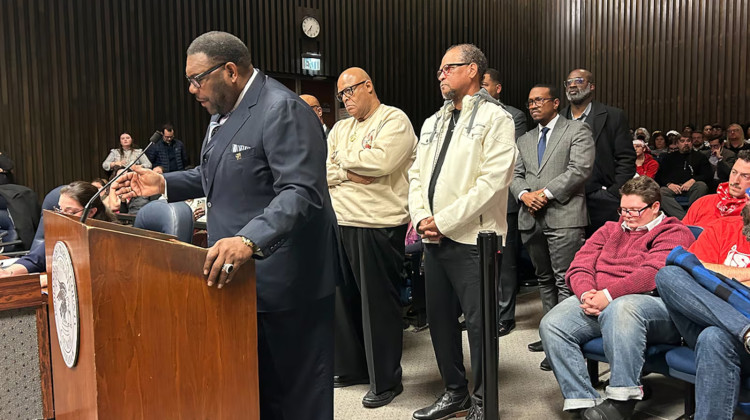
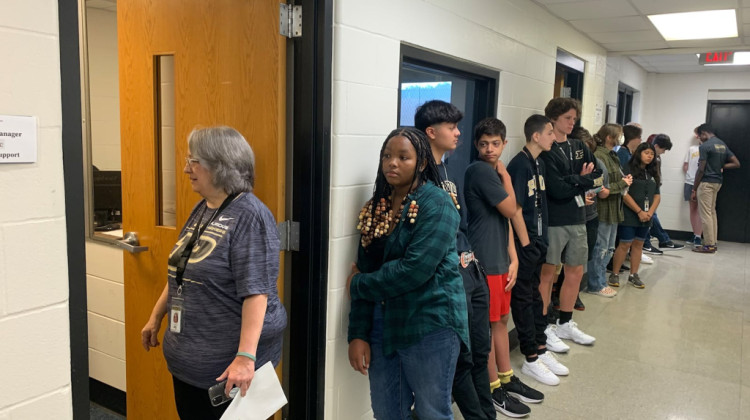
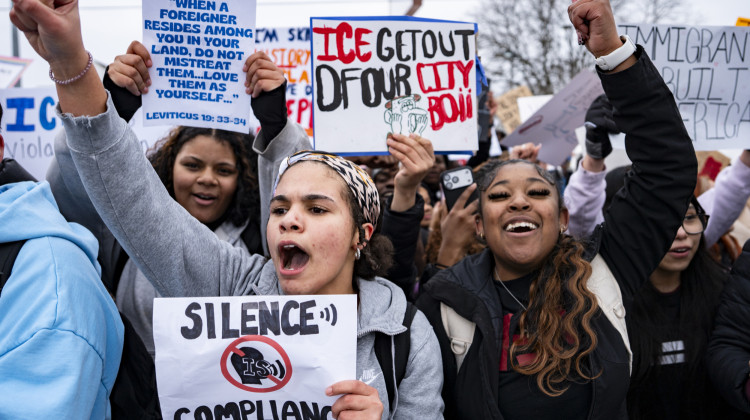

 Support WFYI. We can't do it without you.
Support WFYI. We can't do it without you.